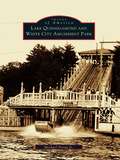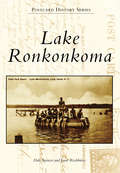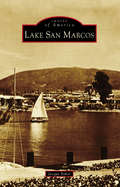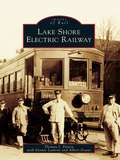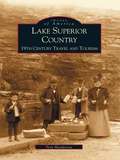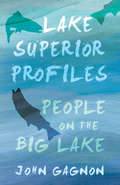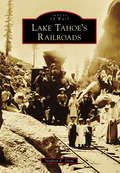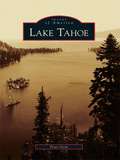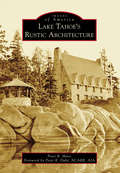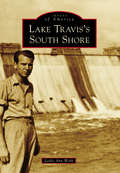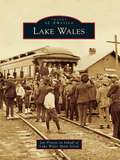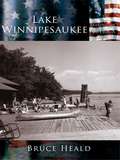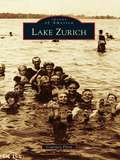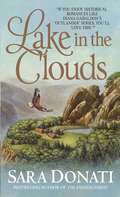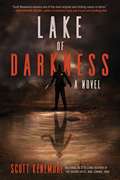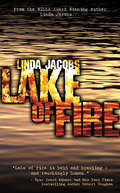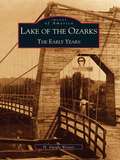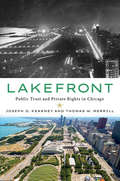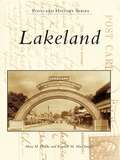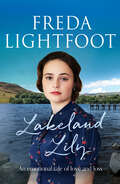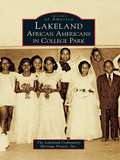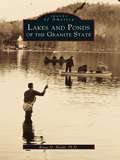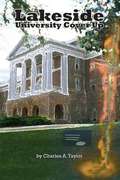- Table View
- List View
Lake Quinsigamond and White City Amusement Park (Images of America)
by Michael Perna Jr.In the 1800s and well into the 1900s, the area around Lake Quinsigamond, in Shrewsbury and Worcester, was one huge summer resort. Hotels, ethnic and social clubs, boat clubs, a horse racing track, picnic grounds, and two amusement parks, Lincoln Park and White City Park, lined the shore. Steamboats and smaller steam launches transported tourists to the area. Canoes, rowboats, sailboats, and motorboats crowded the lake on weekends. Crew boat regattas, which started in the 1850s, continue to this day. Lake Quinsigamond and White City Amusement Park lets readers experience the attractions, such as the shoot the chutes and White City roller coaster, and enjoy the fun atmosphere during those long-ago summers.
Lake Ronkonkoma
by Dale Spencer Janet RischbieterThe town of Lake Ronkonkoma began as a small farming community. By the 1870s, the lake's reputation as a vacation destination was spreading among wealthy New York City residents. The completion of the Long Island Motor Parkway in 1911 made the lake accessible to early automobile enthusiasts, and over time, as more could afford automobiles, the rich and poor alike flocked to its sparkling shores for swimming, boating, and fishing. In 1921, local businessman George C. Raynor created Raynor's Beach, the first in the lake's era of grand beach pavilions. By the mid-1920s, beach pavilions were located all around Lake Ronkonkoma's three miles of shoreline. Lake Ronkonkoma provides a view into the rich history of this unique community and its transformation to a bustling summer resort.
Lake San Marcos
by Jacque BakerIn 1962, the Frazar brothers purchased 1,648 acres of land, which included a 40-acre lake, in San Diego's North County with the goal of building a lakeside community of homes and two golf courses. By 1964, the lake was enlarged to 80 acres and the land was reshaped to accommodate 1,500 homes (eventually growing to over 2,500 homes); two golf courses, one a private country club and the other a public course; and a bridge across the lake. A motel, restaurant, shopping center, and residents' recreation center were later added. In 1967, the National Home Builders Association Convention in Chicago awarded the Lake San Marcos design the title of "Best Planned Lakeside Community in the Nation."
Lake Shore Electric Railway
by Dennis Lamont Albert Doane Thomas J. PattonThe Lake Shore Electric Railway commenced operation in 1893 on the north coast of Ohio, providing transportation to Cleveland, Lorain, Sandusky, Toledo, and on to Detroit, Michigan. The Lake Shore Electric Railway connected with many other electric railroads to offer a comprehensive quilt of transportation. This allowed increased commerce, ease of transportation, and access for the industrial-era family to visit such recreation spots as Linwood, Crystal Beach, Avon Beach Park, Mitiwanga, Rye Beach, Ruggles Grove and Beach, and Cedar Point, among others. An unimaginable feat in the late 1800s, the Lake Shore Electric could travel from Lorain to Cleveland (approximately 30 miles) in under one hour, making the railway a huge success. Unfortunately this success only lasted about 40 years.
Lake Superior Country: 19th Century Travel and Tourism
by Troy HendersonWhat attracted 19th century travelers to the rugged landscape of Michigan's Upper Peninsula? Most travelers had to brave the frigid, gigantic, and the often-perilous Lake Superior to gain entrance to the Upper Peninsula. But although the lake and rugged terrain often made it difficult for travelers to traverse the Upper Peninsula, it also often made travel an adventurous and enjoyable occasion.Lake Superior Country: 19th Century Travel and Tourism to Michigan's Upper Peninsula will follow these 19th century travelers, from the explorers in search of land titles and valuable mineral deposits in the early part of the century, to "literary travelers" seeking to witness the romantic region made famous by Henry W. Longfellow's poem "The Song of Hiawatha," to the sportsmen and sportswomen who found a bounty of wildlife and fishing grounds. It will also illustrate the various methods of travel undertaken by these people, from birch bark canoes, to steamers, to the railroads, and how these different methods of travel defined the overall tourist experience.
Lake Superior Profiles: People on the Big Lake
by John GagnonIntroduces readers to ordinary, offbeat, and interesting people living on and around Lake Superior.
Lake Tahoe's Railroads (Images of Rail)
by Stephen E. DrewLake Tahoe is the majestic mountain lake that spans the boundary line of California and Nevada. The lake’s clarity and scenic beauty are legendary. In the 1870s, the Nevada Comstock Lode created an insatiable appetite for Lake Tahoe’s virgin pine forests. The timbers would shore up underground mining and build communities approaching 40,000 inhabitants. Railroads on three shores delivered the logs lakeside, where they were towed by steam-powered tugs to sawmills, to lumber flumes, and again by rail to their final destinations. As the mines and giant lake pines subsided, railroads pushed farther north after 1898 into new timber stands in the Lake Tahoe and Truckee River basins. Other rail lines were sold, barged across the lake, and repurposed for the burgeoning new industry of tourism. For the next 40 years, railroads marketed Lake Tahoe as their unique scenic destination.
Lake Tahoe: A Maritime History (Images of America)
by Peter GoinThe Washoe Indians called it Tah-ve, an unfathomable liquid sapphire set in a 500 square-mile watershed of alpine snow and ice. Too deep and vast to freeze, Lake Tahoe's waters have, over time, reflected pristine forests, barren hillsides littered with slash and sawdust, managed restoration, and the glow of neon casino marquees. Its spectacular natural landscape, shared by both California and Nevada, is more designed than people realize. Humans transformed most of the old trees into mine shafts and cities. When the railroad, and later the automobile, domesticated the lake, putting it within recreational reach of the middle class, much of Lake Tahoe's shore became a managed wilderness. Its location along a political border created a unique merger of naturalist and gaming economies.
Lake Tahoe’s Rustic Architecture (Images of America)
by Peter Mires Peter R. Dubé NCARB AIALake Tahoe is the gem of the Sierra Nevada. Those who visit this beautiful "Lake of the Sky" may share Mark Twain's impression of the place as he camped on its shore in 1861: "As it lay there with the shadows of the mountains brilliantly photographed upon its still surface I thought it must surely be the fairest picture the whole earth affords." Twain's quote, from Roughing It, includes the trinity of Tahoe's landscape--sky, mountains, and lake--that people still find inspiring. This explains, in large part, why the man-made environment around the lake is predominantly rustic, a style of architecture noted for its compatibility with its surroundings through the use of natural materials in construction--logs, stone, and wooden shingle--along with muted shades of green and brown. Through its homes, resorts, and other assorted buildings, Lake Tahoe remains "the fairest picture."
Lake Travis's South Shore (Images of America)
by Leslie Ann WebbThe Colorado River, running through Austin, Texas, and the area now referred to as Lake Travis, has always been a beautiful place to live. The early settlers found it suitable for farming and ranching--until it rained. The rain soaked up soil, and water upstream often engorged the land and washed out everything in its path. Pres. Franklin D. Roosevelt's New Deal created agencies that constructed hydroelectric dams for the Tennessee Valley Authority, and those were used as blueprints for the Lower Colorado River Authority. The ground-breaking for the Mansfield Dam took place on February 19, 1937, and the dam was completed in 1942, providing power and flood control for the area. The dam created Lake Travis and brought about a new recreational industry. Boat docks, lodges, and parks sprang up along the newly created lake, and they are still enjoyed today.
Lake Wales (Images of America)
by Jan Privett Lake Wales Main StreetLake Wales, "Crown Jewel of the Scenic Highlands," is nestled among rolling hills and sparkling lakes in the geographic center of Florida. Before the 1900s, this area of the Lake Wales Ridge was considered spectacularly beautiful but uninhabitable because the virgin forests did not have road or railroad access. Only Native Americans and a few white hunters had camped there. G. V. Tillman explored the untamed area in 1902 and fell in love with the beauty. He knew that the land was ideal for citrus, the old-growth pines could provide profits from turpentine, and the natural beauty would attract quality settlers to build a quality town. He shared his vision with three other businessmen, and together they formed the Lake Wales Land Company in 1911. Their timing was perfect. The Atlantic Coast Line Railroad reached Lake Wales that year and brought on the boom time.
Lake Winnipesaukee
by Bruce HealdA world unto itself, Lake Winnipesaukee and its environs have attracted and sustained a variety of cultures over the past centuries, from early American Indian tribes, to New World settlers, to today's seasonal tourists. Whether Indian hunter, aspiring pioneer, or modern-day angler, each, in turn, fell for the region's wild allure: its sheer natural beauty, fertile soils, and waters teeming with an assortment of fish, including great quantities of shad, salmon, pickerel, smelt, and trout. Within this magnificent setting, scores of hardy, resolute frontier men and women worked tirelessly to fashion homes and towns along the bays, tributaries, islands, and shoreline of the lake. Lake Winnipesaukee documents the history of the region from its early Native American heritage to the lasting legacy of the first American settlers. With over 150 accompanying illustrations, the many stories recorded in this unique volume evoke memories of a simpler way of life, when the lake was evolving from a scattering of humble villages, like Laconia, Meredith, and Wolfeboro, and just beginning to toy with a budding tourist industry. Readers of many generations will enjoy reliving the early summer camps, upstart businesses, and the variety of entertainment and recreation the lake's waters have provided, such as canoe trips, steamships rides, and ski boat adventures.
Lake Zurich (Images of America)
by Courtney FlynnLake Zurich, a northwest suburb of Chicago, includes a beloved body of water that shares its name and has served as its heart. But the lake did not always bear the same moniker. First known as Cedar Lake because of its many surrounding cedar trees, Lake Zurich was renamed by early settler Seth Paine, who thought its beauty resembled the well-known lake in Switzerland. Early on, visitors from Chicago and beyond journeyed by horse and buggy to relax by Lake Zurich's banks, fish and boat on its sparkling waters, and vacation in summer cottages that dotted its shores. But it has been the people of Lake Zurich who have kept its heart pumping. The celebration of their achievements is apparent throughout town. Parks are named after businessmen and local leaders like Fred Blau and Henry "Hank" Paulus. Schools' names highlight educators like May Whitney and Spencer Loomis. Lake Zurich's legacy will continue through its lake and the people who have loved it.
Lake in the Clouds (Wilderness, Book #3)
by Sara DonatiIn her extraordinary novels Into the Wilderness and Dawn on a Distant Shore, award-winning writer Sara Donati deftly captured the vast, untamed wilderness of late-eighteenth-century New York and the trials and triumphs of the Bonner family. Now Donati takes on a new and often overlooked chapter in our nation's past--and in the life of the spirited Bonners--as their oldest daughter, the brave and beautiful Hannah, comes of age with a challenge that will change her forever.
Lake of Darkness: A Novel
by Scott KenemoreAn Alternate History in which Power, Crime, and the Supernatural Intersect on the South Side of Chicago During the First World War, on the South Side of Chicago, officer Joe &“Flip&” Flippity has begun an investigation into a serial decapitationist who is hunting young children. At a time when African American officers are rendered second-class by prejudicial policies, Flip is nonetheless called upon by the mayor of the city—the legendary Big Bill Thompson himself—and a host of powerful city fathers, to thwart this murderer who threatens to destroy the city's reputation as a safe haven for those making the Great Migration north. While searching to catch his killer—and to discover why the most powerful men in Chicago are truly concerned about the murders of poor black refugees—Flip's bloody trail takes him through the South Side&’s vice districts (where anything is available for a price), across its most dangerous criminal underbellies, and into a bracing and unexpected world of supernatural horror. As Flip digs deeper in his quest to protect the city&’s most vulnerable, he stumbles upon more mysterious murders, confounding psychological puzzles, and terrifying hints of something "other" that may reach across from unknowable distances to guide the hand of a killer. It soon becomes apparent that all is not as it seems, and that mysterious and powerful forces are conspiring to stand in Flip&’s way. A combination of detective thriller, cosmic horror, and historical fiction, Lake of Darkness takes us to the deepest and darkest places in Chicago&’s very dark history.
Lake of Fire
by Linda JacobsIn 1900, Cord Sutton travels to the newly developed Yellowstone Park. Born one quarter Nez Perce, Cord intends to gain respect by buying the Lake Hotel. On his way, Cord rescues Chicago heiress, Laura Fielding, from a stagecoach robbery, and soon discovers her father is his rival for the property. Original.
Lake of the Ozarks: The Early Years
by H. Dwight WeaverSeventy years ago in the Ozarks of southern Missouri, Bagnell Dam was built across the Osage River, creating the beautiful Lake of the Ozarks. Using over 200 images and in- depth captions, author H. Dwight Weaver takes readers back to the origins of this man-made treasure and the towns that surround it. Construction on Bagnell Dam began in 1929, employing thousands of men during the Great Depression. Inundation of the Osage River valley destroyed the area's most fertile farmlands, covered numerous historic sites, and even destroyed Linn Creek, the county seat. But the development also created new towns and a new economy. The images in this new book follow the growth of towns along U.S. Highway 54, including Eldon, Tuscumbia, Bagnell, Osage Beach, and Linn Creek, through the Depression, World War Two, and finally the booming 1950s.
Lake of the Ozarks: Vintage Vacation Paradise
by H. Dwight WeaverWhen the Union Electric Company finished constructing Bagnell Dam in 1931, they had done more than build a source of electrical power-they had created a vacation paradise. Bordered by lush hills and ancient bedrock, the Lake of the Ozarks covers more than 50,000 acres. Since the opening of the lake's first boat docks, three generations of visitors have spent countless days relaxing by its waters. H. Dwight Weaver reconstructs these lazy days, offering readers a vintage tour of one of America's favorite destinations. Each generation witnessed the area's growth, from rustic rock masonry buildings to gravity-defying mystery houses. While travelers in the 1930s and 40s came seeking respite from the Great Depression and World War II, their children and grandchildren returned in happier times, drawn back by the natural beauty and man-made wonders, as illustrated in these historic images.
Lakefront: Public Trust and Private Rights in Chicago
by Thomas W. Merrill Joseph D. KearneyHow did Chicago, a city known for commerce, come to have such a splendid public waterfront—its most treasured asset? Lakefront reveals a story of social, political, and legal conflict in which private and public rights have clashed repeatedly over time, only to produce, as a kind of miracle, a generally happy ending. Joseph D. Kearney and Thomas W. Merrill study the lakefront's evolution from the middle of the nineteenth century to the twenty-first. Their findings have significance for understanding not only Chicago's history but also the law's part in determining the future of significant urban resources such as waterfronts. The Chicago lakefront is where the American public trust doctrine, holding certain public resources off limits to private development, was born. This book describes the circumstances that gave rise to the doctrine and its fluctuating importance over time, and reveals how it was resurrected in the later twentieth century to become the primary principle for mediating clashes between public and private lakefront rights. Lakefront compares the effectiveness of the public trust idea to other property doctrines, and assesses the role of the law as compared to more institutional developments, such as the emergence of sanitary commissions and park districts, in securing the protection of the lakefront for public uses. By charting its history, Kearney and Merrill demonstrate that the lakefront's current status is in part a product of individuals and events unique to Chicago. But technological changes, and a transformation in social values in favor of recreational and preservationist uses, also have been critical. Throughout, the law, while also in a state of continual change, has played at least a supporting role.
Lakeland (Images of America)
by Lynn M. Homan Thomas ReillyMunnville, Rome City, and Redbug were just a few of the suggested names for the small Central Florida community that would come to be known as Lakeland. Not long after its founding, other descriptive monikers-"Lovely City of Lakes" and "Highest, Healthiest, Busiest"-would be applied. Recently ranked as the tenth "Best Place to Live" of medium-sized cities in the South, Lakeland today offers an entrancing combination of contrasting elements that all work well together. Fields of strawberries and rolling hills covered with citrus groves surround a growing city comprised of a mixture of structures, both new and old, modern and beautifully preserved. Commercial entities join with cultural organizations in mutually beneficial relationships to produce a quality of life that many other cities only hope to attain. Lakeland may well be as it was advertised in 1905-"Florida's Best Town."
Lakeland (Postcard History)
by Mary M. Flekke Randall M. MacdonaldLakeland celebrates the history of one of central Florida's most scenic cities. The small town that encompasses dozens of lakes was perfectly named in 1883, and grew to include an eclectic mix of downtown buildings, elegant hotels, roadways, handsome parks, and picturesque neighborhoods. By mid-century, Lakeland had grown to support small industries, churches, several schools, an airport, and two small colleges, one of which features the largest single-site collection of Frank Lloyd Wright architecture.
Lakeland Lily: An emotional tale of love and loss (Lakeland Sagas)
by Freda LightfootWhen tragedy strikes, she must find a new path…Lily Thorpe is spirited, ambitious and desperate to escape the poverty of her Lake District home, and marry her secret sweetheart Dick Rawlins. But tragedy strikes and Dick is killed in a boating accident caused by the wealthy and arrogant Clermont-Read family. Lily is forced to reassess her future, and she embarks on a quest for revenge and marries Bertie Clermont-Read. The young couple are rejected by his family and suffer the same poverty Lily had tried to escape. Lily starts a passionate affair with local steam boat captain Nathan Monroe and when she is threatened with vengeance she must decide who is more important – her husband or her lover.A page-turning saga of love and heartache, perfect for fans of Katie Flynn and Val Wood.
Lakeland: African Americans in College Park (Images of America)
by The Lakeland Community Heritage Project, Inc.Lakeland, the historical African American community of College Park, was formed around 1890 on the doorstep of the Maryland Agricultural College, now the University of Maryland, in northern Prince George's County. Located less than 10 miles from Washington, D.C., the community began when the area was largely rural and overwhelmingly populated by European Americans. Lakeland is one of several small, African American communities along the U.S. Route 1 corridor between Washington, D.C., and Laurel, Maryland. With Lakeland's central geographic location and easy access to train and trolley transportation, it became a natural gathering place for African American social and recreational activities, and it thrived until its self-contained uniqueness was undermined by the federal government's urban renewal program and by societal change. The story of Lakeland is the tale of a community that was established and flourished in a segregated society and developed its own institutions and traditions, including the area's only high school for African Americans, built in 1928.
Lakes and Ponds of the Granite State (Images of America)
by Bruce D. HealdNature chose to endow New Hampshire with an infinite variety of lakes and ponds, almost inexhaustible in resources and unlimited in beauty. Each lake holds its own fishing secrets, curving nooks, jagged rocks, and intricate shoreline. For generations, the lakes and ponds have wielded their magnetic force,attracting thousands of residents and visitors in every season of the year. Lakes and Ponds of the Granite State invites you to explore the many wonders of these charmed places. You will see the sun glancing off the wind-flecked surface, hear the breeze rustle the shoreward-bending trees, feel the coolness of the water, and eye a prized trout or two. You will encounter not only those lakes that come to mind first--Winnipesaukee, Sunapee, Squam, and Newfound--but nearly one hundred others, including Dublin and Spofford and the breathtaking Gloriette Lake.
Lakeside University Cover Up
by Charles A. TaylorA cross is burned in the yard of two black Lakeside University students. When campus officials call the incident a harmless prank, both black and white student organizations, launch a series of protests to force the administration into conducting a full investigation. Instead, the administration devises a divide and conquer scheme to create a rift between black and white students. As black students turn up the pressure, the campus stands on the verge of a racial explosion. Campus leaders must find a way out of the crisis so they seek the help of Dr. Wendell Oliver, the country's leading expert in diffusing racial tension. Dr. Oliver takes the feuding students on a weekend retreat filled with action, danger, sexual attraction and racial conflict. He helps students look beyond themselves and discover the secret behind the cross burning. They learn that the cross burning is more than just about racism. Its wicked flames shed light on corrupt cops, complicit college administrators and misguided attitudes that point to a major cover up. When students piece the puzzle together, justice is finally served, but it comes with a steep price. Lakeside University will never be the same again.
